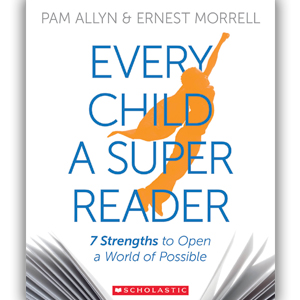
Raising Readers: A Review of Every Child a Super Reader
Want to raise a reader? This month, I decided to review Every Child a Super Reader by Pam Allyn and Ernest Morrell in the hopes of keeping my kids’ positive summer reading experiences alive throughout the school year. According to the authors, immersing children in a literature-rich community results in critical yet passionate readers. Centered on seven strengths, this book offers explanations why “super reading” translates into high achievement but how it builds empathy, too.
Allyn and Morrell explain, “Children need to be taught why it’s important to read and have clear reasons to read – if they are going to learn how to read well.” They believe this purpose has gotten lost in most classrooms. Therefore, they developed the “super reader” model.
What is a “super reader”? According to Allyn and Morrell, it’s a “child who enters a text with purpose. Regardless of platform (print or digital) and genre (fiction, informational, or poetry), she reads that text with deep comprehension and finishes it feeling satisfied, informed, and inspired.” As the authors remind us, words are central to our world, which is why it’s important children learn to live among them.
Allyn and Morrell also insist, “Reading is the great equalizer.” They report on research that shows pleasure reading as a “greater influence on a child’s vocabulary, math, and spelling scores than whether their parents held degrees.”
Therefore, in Every Child a Super Reader, they offer a tool kit to developing one. The biggest things parents can take away:
- Contrary to what many people believe, “Reading is not solitary,” argue Allyn and Morrell. Super readers understand that speaking and listening play an important role when constructing the meaning of a story. The more readers share the more they are likely to gain from the reading experience. My kids and I not only enjoy talking about books over dinner but also recommending titles to each other on Goodreads. Taking our passion for reading online enabled us to stay engaged, since there’s always another exciting title on our “to-read” list to tackle.
- “Reading is like breathing in and writing is like breathing out,” claim Allyn and Morrell. This is not only a beautiful image but an accurate one. Once children recognize the connection between these processes they are better able to read like a writer – noticing how the text is constructed – and then write like a reader – anticipating the audience’s needs. For years, I’ve been organizing a book club for elementary school students at our local library. This year, my fifth grader asked if we could turn it into a Writing Club since she has so many ideas for new stories. This is exactly the kind of the natural progression Allyn and Morrel write reading encourages.
- “Read aloud, read aloud, read aloud,” maintain Allyn and Morrell. Many parents mistakenly stop reading to their children once they can read to themselves, but as Allyn and Morrell explain, reading aloud exposes children to more difficult vocabulary and story lines than they can read on their own. If you want your child to be a super reader, then you need to be sure they are exposed to a variety of genres on different reading levels. I find my children gravitate to their favorites – my older daughter (14) to realistic fiction and my younger daughter (10) to fantasy. When I read to them before bed, I tend to read historical fiction, like this month’s The Evolution of Calpurnia Tate by Jacqueline Kelly, so we can discuss topics they might not encounter on their own.
Every Child a Super Reader: 7 Strengths to Open a World of Possible offers parents book suggestions as well as family guides with a host of ideas to reinforce the strengths super readers engage in: belonging, curiosity, friendship, kindness, confidence, courage, and hope. So if you’re interested in learning more about raising a reader, check out this great resource.
Follow @ParentbytheBook on Twitter for updates on blog posts or like Parenting by the Book on Facebook.






